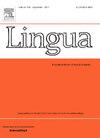关系竞争和英语水平在中国英语学习者名词-名词复合识别中的作用
IF 1.3
3区 文学
0 LANGUAGE & LINGUISTICS
引用次数: 0
摘要
最近关于英语母语者对名词-名词复合词视觉识别的研究表明,竞争机制是由与这些复合词相关的潜在概念关系触发的。虽然在英语二语使用者(特别是汉语使用者)中发现了复合加工中基于关系的语义构成,但关系竞争的作用尚不清楚。本研究采用操纵词型和关系竞争的词汇决策任务,考察了60名中高级英语学习者对名词-名词复合词的加工。结果表明,复合加工中涉及的概念关系对加工速度有一定的影响。此外,处理速度与关系竞争的程度密切相关,竞争越强,反应时间越长。此外,英语水平显著影响加工效率,英语水平越高的学习者反应越快。此外,当考虑到关系竞争和复合频率时,两个熟练程度组之间出现了质的差异。本文章由计算机程序翻译,如有差异,请以英文原文为准。
Examining the role of relational competition and English proficiency in noun-noun compound recognition among Chinese EFL learners
Recent findings on English L1 speakers’ visual recognition of noun-noun compounds suggest that competitive mechanisms are triggered by potential conceptual relations associated with these compounds. While relation-based semantic composition in compound processing has been found in English L2 speakers (specifically Chinese speakers), the role of relational competition remains unclear. This study employed a lexical decision task manipulating word type and relational competition to examine the processing of noun-noun compounds among 60 Chinese EFL learners at intermediate and advanced proficiency levels. Results indicate that processing speed was influenced by the conceptual relations involved in compound processing. Moreover, processing speed was closely linked to the degree of relational competition, with stronger competition leading to longer response times. In addition, English proficiency significantly influenced processing efficiency, as higher-proficiency learners responded more quickly. Furthermore, qualitative differences between the two proficiency groups emerged when both relational competition and compound frequency were considered.
求助全文
通过发布文献求助,成功后即可免费获取论文全文。
去求助
来源期刊

Lingua
Multiple-
CiteScore
2.50
自引率
9.10%
发文量
93
审稿时长
24 weeks
期刊介绍:
Lingua publishes papers of any length, if justified, as well as review articles surveying developments in the various fields of linguistics, and occasional discussions. A considerable number of pages in each issue are devoted to critical book reviews. Lingua also publishes Lingua Franca articles consisting of provocative exchanges expressing strong opinions on central topics in linguistics; The Decade In articles which are educational articles offering the nonspecialist linguist an overview of a given area of study; and Taking up the Gauntlet special issues composed of a set number of papers examining one set of data and exploring whose theory offers the most insight with a minimal set of assumptions and a maximum of arguments.
 求助内容:
求助内容: 应助结果提醒方式:
应助结果提醒方式:


